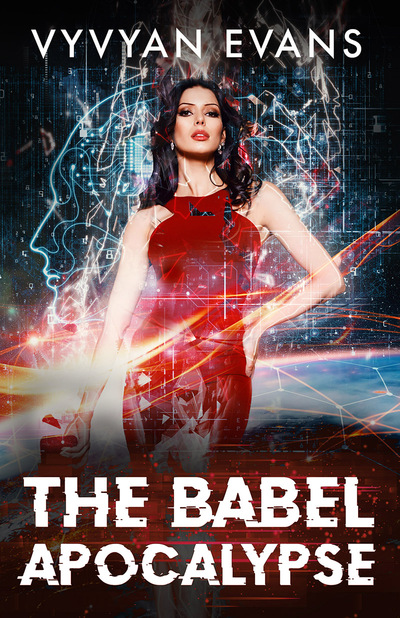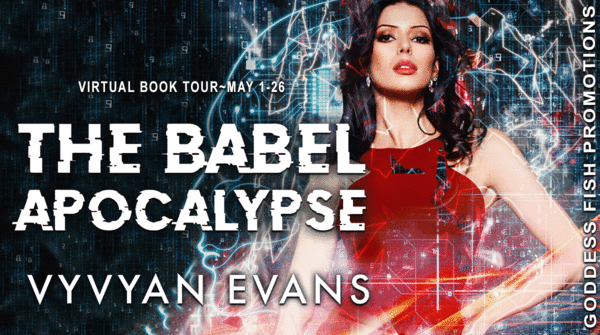By Vyvyan Evans (Guest Author)
The Babel Apocalypse imagines a future in which we stream language directly to neural implants in our heads. Today, we stream anything from movies, to books, to music, to our ‘smart’ devices, and consume that content. Smart devices use streaming signals—data encoded in IP data packets—encoded and distributed via wi-fi internet.
Given my background as a professor of linguistics, a “what if” question occurred to me: What if we also streamed language? And what would the consequences be for us as human beings, if we no longer had to learn it? What would we gain, and more importantly, what would we lose, if language became a commodity, controlled by big tech? Clearly, with recent developments in AI and Chatbots, this is no longer far-fetched.
Language streaming would work, in principle, in the same way as streaming wifi devices today. With a ‘language chip’ implanted in our brains, in the future we will be able to ‘stream’ language from internet-in-space on demand, 24/7.
Moreover, based on an individual’s level of subscription to a language streaming provider, they would be able to stream any language they chose, with any level of lexical complexity. This means that someone could, potentially, apply for a job in any country in the world, without needing to be concerned about knowing the local language. Rather, the individual would just draw upon the words and grammar they need, to function in the language, by syncing to a language database, stored on a server in space. And call it up, over the internet, in real time, as they think and talk. It means that everything someone needs to know, to be able to use a language, is streamed over the internet, rather than being stored in someone’s head. Language learning, thus, becomes obsolete.
Science fiction has a long and illustrious habit of predicting the future. In 1940, with his first in the Robot series of stories, Isaac Asimov predicted some of the ethical issues that would arise as artificial intelligence comes to have a more pervasive influence in our daily lives.
Today in the twentieth first century, we are on the brink of a Fourth Industrial Revolution, sometimes dubbed 4IR. This is where automation and connectivity, via the internet, will dramatically alter the way in which we interact with each other, as well as everything around us, in our increasingly joined-up technological environment. And I predict, in less than one hundred years from now, this new technology will transform many aspects of our daily lives that we currently take for granted, including language itself.
Indeed, in 2015, many of the world’s leading scientists, warned, in an Open Letter and accompanying report, against the new dangers of AI, as a consequence of 4IR. This Open Letter was issued in response to new breakthroughs in AI that, without adequate control, might pose short and long-term existential threats to humans.
But potential dangers come not just from the use of AI, in the sense of, for instance, The Terminator series of movies, in which AI seeks to wage war and destroy the human race. New implantable devices, that will enhance how we as humans can interact with our new tech-landscape, will also give rise to potential dangers. Language is, arguably, the single trait that is the hallmark of what it is to be human. And yet, in the near-future, language-chipped humans, or ‘transhumans’, will have enhanced abilities that bring new opportunities, as well as ethical challenges and even threats.
Of course, for a new ecosystem of implantable language chips to gain traction, as predicted in The Babel Apocalypse, big tech would need to lead with the initial investment, once the value of the product has been established. And there are significant initial costs, in terms of implanting the body-borne hardware.
The Babel Apocalypse imagines the process beginning with a public referendum, in California, after which all adults must undergo “chipping”. And there would be a transitional generation, as minors also undergo language chipping at the age of eighteen, and newborns at birth, moving forward. And from there, the initial benefits of language streaming would appear to outweigh any ethical or civil liberty concerns.
Blurb
Language is no longer learned, but streamed to neural implants regulated by lang-laws. Those who can't afford language streaming services are feral, living on the fringes of society. Big tech corporations control language, the world’s most valuable commodity.
But when a massive cyberattack causes a global language outage, catastrophe looms.
Europol detective Emyr Morgan is assigned to the case. His prime suspect is Professor Ebba Black, the last native speaker of language in the automated world, and leader of the Babel cyberterrorist organization. But Emyr soon learns that in a world of corporate power, where those who control language control everything, all is not as it seems.
As he and Ebba collide, Emyr faces an existential dilemma between loyalty and betrayal, when everything he once believed in is called into question. To prevent the imminent collapse of civilization and a global war between the great federations, he must figure out friend from foe—his life depends on it. And with the odds stacked against him, he must find a way to stop the Babel Apocalypse.
Excerpt
It wasn’t her cold beauty that marked out Ebba Black as unique—her chilling looks, as she called them—although her looks invariably made an impression on all who met her. Rather, it was the fact that she was the last nate in the automated world. That made her famous. Undoubtedly she was celebrated for other things too—Ebba Black the Babelist, the heiress, the conspiracy theorist, the charismatic professor. Maybe even the oddity. After all, Ebba was the last speaker of languages that would die with her. With Elias’s passing five years prior, she had no one left to speak them with. And Ebba Black would not marry. Commitment of that sort wasn’t her thing, and she would certainly never have children. You could say she wasn’t the maternal type.
Ebba knew she was unique in other, ineffable ways, too. For one, she listed things to herself, silently, in her head. Reasons to know me. Reasons not to know me. Reasons to hate me, to admire me. But not reasons to love me. Never that. That was forbidden. Ebba never allowed anyone to get that close.
Sometimes Ebba even indulged in one of her trademark waspish grins. To no one in particular, while she mentally scrolled through one list: reasons to kill. The list with the names. Her list of lists. The grin was the only outward sign she was performing a mental stock-take. It wasn’t good to be on that particular list. Ebba Black was neither the forgiving nor the tolerant type.
About the Author
Dr. Vyvyan Evans is a native of Chester, England. He holds a PhD in linguistics from Georgetown University, Washington, D.C., and is a Professor of Linguistics. He has published numerous acclaimed popular science and technical books on language and linguistics. His popular science essays and articles have appeared in numerous venues including 'The Guardian', 'Psychology Today', 'New York Post', 'New Scientist', 'Newsweek' and 'The New Republic'. His award-winning writing focuses, in one way or another, on the nature of language and mind, the impact of technology on language, and the future of communication. His science fiction work explores the status of language and digital communication technology as potential weapons of mass destruction.
Book website (including ‘Buy’ links): www.songs-of-the-sage.com
Author website: https://www.vyvevans.net/
Youtube channel:https://www.youtube.com/@vyvevans
Twitter:https://twitter.com/VyvEvans
Facebook: https://www.facebook.com/Vyvyan.Evans.Author
Instagram:https://www.instagram.com/nephilim_publishing/
The Babel Apocalypse earned a starred review in Kirkus: "A perfect fusion of SF, thriller, and mystery—smart speculative fiction at its very best."
The full review is here: https://www.kirkusreviews.com/book-reviews/vyvyan-evans/the-babel-apocalypse-songs-of-the-sage/
The author will be awarding a physical paperback copy of the book (available internationally) to a randomly drawn reader who enters the drawing.



2 comments:
Thanks for hosting!
This sounds fascinating! It's especially interesting that you'd come up with this premise given your profession.
Thanks for being my guest.
Post a Comment
Let me know your thoughts! (And if you're having trouble commenting, try enabling third-party cookies in your browser...)